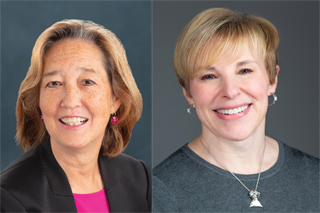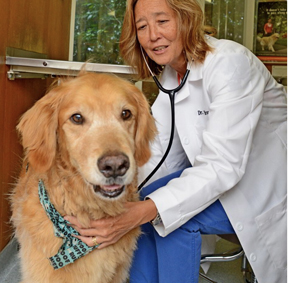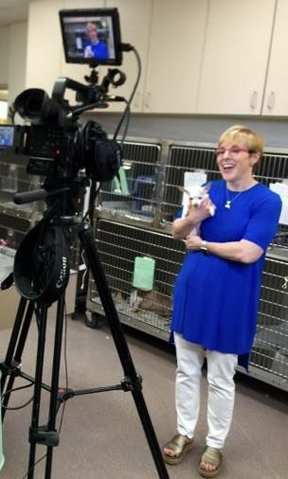gracelori2

American Veterinary Medical Association photos
Dr. Grace Bransford (left) and Dr. Lori Teller, each of whom has spent decades volunteering in organized veterinary medicine, are in a race to become this year's president-elect and serve as 2022-23 AVMA president. The House of Delegates will determine the winner on Friday.
Two women are running for president-elect of the American Veterinary Medical Association in the first female-only race for the office in the organization's 158-year history.
If elected, Dr. Grace Bransford, former AVMA vice president, would be the first Japanese-American to take the seat, while Dr. Lori Teller, chair of the AVMA Board of Directors, would be the association's first female president to have raised a child while in practice.
No matter whom the AVMA House of Delegates elects on Friday during the group's annual meeting in Chicago, one thing is certain: The winner will be the organization's fourth female president since it was founded in 1863, and that now represents a profession in which the majority of members are women.
That short list starts with Dr. Mary Beth Leininger, the first woman to become president-elect in 1995. She began her one-year presidential term in July 1996. Drs. Bonnie Beaver and René Carlson earned the title in 2004 and 2011, respectively.
The scant number of women in the role isn't lost on either candidate, though both reflect on a sizable shift within other facets of AVMA leadership. The House of Delegates — the AVMA policymaking body comprised of representatives from every state and more than a dozen allied groups — increasingly skews female, as does the AVMA Board of Directors. In 2016, Dr. Janet Donlin became the AVMA's first female executive vice president.
Bransford and Teller, both of whom have served in the AVMA for more than a decade, say they've been a witness to the gender shift. "We have very two qualified candidates running, and I'm very proud to be a part of that," Teller said.
The job entails acting as the face of the AVMA, the nation's largest organization for the profession with more than 95,000 members. Dr. José Arce, a practitioner from San Juan, Puerto Rico, became president-elect last year and soon will begin his term as president, replacing Dr. Douglas Kratt.
The VIN News Service interviewed the candidates. Short profiles and a Q&A follow.
Dr. Grace Bransford
Veterinary medicine is a second career for Bransford, who recently sold her small animal hospital in San Anselmo, California, and now does relief work in the area. Following a decade in marketing and advertising, she entered the University of California Davis, School of Veterinary Medicine at age 34. After graduating in 1998, she spent three years working as an associate, then bought her own practice.
"I thought I'd graduate and work and get initially involved in (organized veterinary medicine in) Mill Valley, where I'd lived my whole life," she said. "That's what I expected."
But that isn't quite what happened. Bransford got to know the AVMA through her work as a student representative to the California Veterinary Medical Association Board of Governors. She networked with AVMA leaders and was asked to run for AVMA Council on Public Relations, even before passing the National Board Exam, now known as the North American Veterinary Licensing Examination, or NAVLE.
"Very early on, I got involved with the AVMA, so in a way, I mostly bypassed the local and state leadership track," she said, adding that she's participated in, among other things, several committees of the California Veterinary Medical Association. "The more time I spent at AVMA, the more people I got to know and the more experiences I had. My path zigzagged a little. It wasn't the traditional move up the state ladder."
Dr Grace

Photo courtesy of Dr. Grace Bransford
Dr. Grace Bransford owned her own small-animal practice for years and now does relief work.
During the past two decades, Bransford has been a part of AVMA councils and committees, including the 20/20 Vision Commission, the Task Force on Governance and Member Participation, and the Council on Veterinary Service. In 2018, she was elected AVMA vice president and served two years as the association's liaison to veterinary students, faculty and deans, visiting schools throughout the U.S. and the Caribbean.
Just before her time in office, Bransford, who's adopted, uncovered the identities of her biological parents, who are both deceased. She discovered that her mother was interned at Manzanar, one of 10 concentration camps where more than 120,000 Japanese-Americans were incarcerated during World War II. Her biological father, of Northern European ancestry, was a writer and journalist from Seattle who traveled the world. "I'm learning a lot about my heritage," she said. "It's been a process."
Her adoptive parents, Niles and Fusae Fleming, met in Hokkaido, Japan, where Niles, an American, was stationed in the U.S. Army. The couple married and settled in San Francisco. They adopted Bransford as an infant in 1960.
Bransford credits her father, who managed gas stations, for teaching her the value of "having everyone at the table."
"My dad had grown up in rural Montana during the Great Depression, and his folks didn't have much money but lived near the train tracks and would bring in people for a meal," she said. "So as a young child, I witnessed my dad doing the same for people who'd come to the gas station looking for work. I was exposed to people from all races and ethnicities. My dad fundamentally believed that everyone who wanted to work deserved a chance."
Bransford carries that value in her belief that greater economic and racial diversity is needed in the largely white and middle-class veterinary profession. Asked if she's felt the sting of racial discrimination in her professional life, Bransford said she hasn't: "I've been really fortunate. Coming from San Francisco, we're a nice melting pot here."
She's also not eager to see longtime AVMA leaders, many of whom are white men, merely replaced by newcomers. To ensure that everyone within the AVMA has a voice, she's proposed to establish a council of elders in hopes that the profession's institutional knowledge can be better passed to future generations. "We need fresh ideas and energy from folks from all facets and demographics," she said, "and we cannot lose the folks that have a history with the AVMA. Everyone has an important role to play. Like my dad taught me, I think that everyone should have a seat at the table."
Dr. Lori Teller
Dr. Lori Teller said she knows what it means to balance motherhood and veterinary medicine, having raised her son, now 28, while simultaneously building a career and developing a school to accommodate his learning differences.
Opened in 2007, Gateway Academy in Houston is a school for students in grades 6 to 12 whose learning differences impact their academic, social and critical-thinking skills. In the 15 years since it opened, the school has worked with more than 300 families.
Teller, who founded the school, no longer is involved with it on a daily basis, apart from fundraising, but uses the same tenacity, attention to detail and organization that it took to develop the school to also further her professional life, a career she's planned for since age 6.
At age 12, Teller started her first job as a technician and receptionist at Meyerland Animal Clinic in Houston, where she returned to practice upon graduating in 1990 from Texas A&M University College of Veterinary Medicine & Biomedical Sciences. She's a diplomate of the American Board of Veterinary Practitioners in canine and feline practice.
Dr Lori 288

Photo courtesy of Dr. Lori Teller
Dr. Lori Teller describes herself as "super-efficient and organized." She regularly speaks to media on behalf of the AVMA and veterinary medicine.
She stayed on full time until 2018, when Dr. Eleanor Green, then dean of the Texas A&M veterinary program, recruited her for a new position as clinical associate professor of telehealth. "I still go back to Meyerland one day a month because I love being a practicing veterinarian, and I also love teaching students," she said.
She's also heavily involved in organized veterinary medicine. Teller has held several leadership positions at national and state levels and was a founding member of the Women's Veterinary Leadership Development Initiative, which aims to help develop female leaders in veterinary medicine.
In 2015, she was elected to the AVMA Board of Directors, on which she now serves as chair. Teller's term ends this week when the House of Delegates adjourns its meeting.
If elected, Teller would like the AVMA to focus on, among other things, workforce issues, both at veterinary and support-staff levels. She points out that a decade ago during the recession, there were too few jobs for veterinarians in the United States. The opposite is now true.
"If nothing else, the pandemic has driven home that veterinarians are busy, and it has escalated burnout," Teller said. "What can we do in the short term and longer term to have a steady workforce without having these fluctuations? It wasn't too long ago that veterinarians were having a hard time finding jobs. Now the market's just exploded, and there are too many jobs to choose from. We want a steady job market."
One effect of the labor shortage is that veterinary practices are swamped with clients. Teller suggests that veterinarians rely more on technicians and entrust greater responsibility to support staff. "You don't need a veterinarian and a licensed tech drawing blood and putting in catheters," she offered as an example. "Technicians can do that with an assistant, and that's legal wherever there are licensed veterinary technicians. It could free up time for veterinarians."
Candidate viewpoints
The VIN News Service asked Bransford and Teller to respond to questions concerning student debt, telemedicine and the growth of corporate practice chains in the profession.
Question: Student debt is at an all-time high. Mean educational debt among borrowers who graduated from veterinary school in 2020 was just shy of $205,000 — and many enter the workforce owing upwards of $350,000 or more — a trend that gets less attention than it used to as salaries rise along with the need for practitioners. Should student debt remain a concern even though salaries and job prospects have improved?
Teller: Yes, it's a concern. I'm living student debt every day with our students at Texas A&M, and I'm at a state school with one of the lowest rates of student debt. One of the things we talk about in our rotation is what it looks like on the outside once you graduate. Can you be a practice owner, and what does that mean to be a practice owner? What are the resources you need? Will the bank give you money to buy a practice, even if you owe a lot of debt? And finding a path through that. What are the other options alleviating student debt?
I will say I rarely see students being frivolous. They tend to be frugal, and the debt we continue to see is a result of tuition and other multifactorial problems.
Bransford: This issue hasn't fallen off the table because it definitely needs to get addressed. I recently talked to a friend whose daughter just graduated and is at an internship, and they are in a situation where they can pay off her debt, and they plan to. I just thought, how fortunate she is. I owed $60,000 when I graduated, and at the time, I thought that was a lot. I was lucky in that I had all my undergraduate paid off because I had worked for 10 years. I was also lucky that I was married at the time, so we had two incomes. We were able to pay down our debt relatively quickly, in maybe five or six years.
But that's not the case for many. If we want to enhance diversity in this profession, we have to figure out how to help students from different kinds of backgrounds pay for their education, or we'll continue to have a homogeneous student population.
Q: Telemedicine is knocking on the profession's door, with providers from Chewy to the San Francisco Society for the Prevention of Cruelty to Animals aiming to get into the business. Stymieing their growth is a near-universal veterinary-client-patient-relationship regulation that requires a VCPR to be established in-person as the foundation of all future care. The AVMA supports the stance, owing to the fact that animals can't communicate remotely, but many are pushing for change. What's your take?
Teller: Telemedicine in veterinary medicine is not like telemedicine in human medicine. Veterinarians should be comfortable using telemedicine in their own practices, but I support maintaining the in-person exam as a requirement of establishing a VCPR. Virtual care is extremely valuable when done with an existing VCPR. It can increase touchpoint, and build upon a relationship of trust between a client and a veterinarian. At times, it can increase the value the client perceives of veterinary care by improving access to care, increasing efficiencies, and saving time and money. It is also extremely helpful when triaging patients and can save lives.
Bransford: I used a fair amount of telemedicine during the pandemic ... and it showed me the importance of having an in-person exam. You can miss stuff that is very urgent or serious. Maybe the lighting is poor and you can't see the color of mucous membranes well, or you are not sure if the pet owner is able to obtain the true heart rate. I'm a big believer in telemedicine — I think it's really going to help our profession — but I feel there should be a valid VCPR [based on an in-person exam] to use it responsibly.
Q: Corporate-owned practice chains are reshaping the veterinary landscape, acquiring independently owned clinics and consolidating them. What are your thoughts about the proliferation of corporate chains and whether they'll eventually phase out independent ownership?
Teller: This is a complicated issue. I think some independent practices will survive the evolution of corporate medicine. But if veterinary medicine were to become all corporate, that wouldn't be a good thing. I think some aggregators and consolidators do a better job than others, especially if veterinarians are involved in the leadership of the corporate chain. But other consolidators, especially those without veterinarians in charge, are just looking to capitalize on our profession. They don't understand how veterinary medicine is different than human medicine and that we have a completely different infrastructure. Those that respect and understand the similarities and differences between human and veterinary medicine and can build on what is working well in the profession will be much more successful.
Bransford: Corporate practices can be positive if you're thinking about the welfare of the veterinarian and the profession. Corporate programs are helping new graduates pay down their debt, and a lot of times, offer better working hours. There are a lot of people who want to focus on buying homes and raising families and practicing medicine for the sake of practicing medicine. So [in] those situations, if done with the welfare of everyone involved, it can be good. At the same time, we desperately need people to want to own their own practices and be stewards of our community that's been around for so long. Just like in human medicine, it has its place, but a profession-wide takeover is not what anyone wants. Independents need to exist.
Update: Dr. Lori Teller was elected 2021-22 AVMA president-elect. Dr. Grace Bransford is running again, this time for 2022-23 AVMA president, against Dr. Rena Carlson, of Idaho. Additional candidates may announce at a later date.